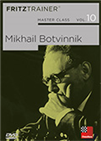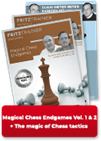A Grand Seigneur of harmony
A chess legend would have turned 100 last week, and as a chronicler, I would like to remind our readers of this great personality and his legacy. Vasily Smyslov was the seventh world chess champion in history. He reigned for only one year (1957-1958), as did Mikhail Tal later on, but his work and legacy remain unforgotten. Smyslov holds the record for the most medals won in Chess Olympiads (17) and was twice Soviet National Champion (1949 and 1955). He played at the highest level for over four decades and competed in the Candidates Tournament for the World Championship in 1948, as well as in the 1950s, 1960s and then again in the 1980s.
Vasily Smyslov was born in Moscow on 24 March 1921. He learned chess from his father at the age of six and showed his great talent for the game early on. At the age of 14, Vasily played his first tournament, and at 17 he became Junior Champion of the USSR and City Champion of Moscow. Smyslov was an excellent student, graduated from high school with honours and then began his chess career. There is an early game of his in which his great talent is clearly visible.
Smyslov quickly matured into a world-class player. He was one of the five grandmasters who played in The Hague and Moscow in 1948 for the world championship title vacant after Alexander Alekhine’s death. Mikhail Botvinnik won the long and difficult tournament, and the young Smyslov came second. In 1953, he obtained a clear victory at the historic Candidates Tournament in Zurich, which David Bronstein immortalized in a great book. This gave Smyslov the right to challenge Mikhail Botvinnik. The 1954 match in Moscow ended 12:12, so Botvinnik retained the title as was the rule at the time.
Vasily Smyslov won the 1956 Candidates Tournament in Amsterdam and again became the World Championship challenger. He had learned the lessons of the first match and said: “The experience of the first duel was useful, I clearly imagined the severity of the upcoming test. Fate offered me the rare opportunity to fight for the world title for a second time”. Smyslov was better prepared this time and won the very first game, which he took as a good omen. The match waved back and forth for a while, but after winning the eighth game Smyslov, as he later wrote, did not let the chance slip away.
 Our experts show, using the games of Botvinnik, how to employ specific openings successfully, which model strategies are present in specific structures, how to find tactical solutions and rules for how to bring endings to a successful conclusion
Our experts show, using the games of Botvinnik, how to employ specific openings successfully, which model strategies are present in specific structures, how to find tactical solutions and rules for how to bring endings to a successful conclusion
1957 World Championship match in Moscow | Photo: Wikipedia
The world had a new chess king in 1957 — the new champion was 36 years old and had an elegant, harmonious style of play. Smyslov was very fond of the planned transition into the endgame, which was his greatest strength. He had thoroughly studied the games of his predecessors Lasker, Capablanca and Alekhine, who were all great endgame artists. “Nowhere does logical thinking emerge so clearly as in the final stage of the game. The great chess players of the past did not pay so much attention to endgames for nothing”, Smyslov emphasized time and again. He himself wrote two great books about the final stage of the game: “Endgame virtuoso” and “Rook endings”. I had the pleasure of translating both works from Russian into German and learned first-hand what a great artist was sharing his deep knowledge with the chess world. Of course, when we first met more than forty years ago, I had no idea that this honour would one day be bestowed upon me...
I met Vasily Smyslov in the autumn of 1979. At that time, an international grandmaster tournament was taking place in Beriln, at the Casino des Berliner Stadions der Weltjugend, which no longer exists. At 58, the former world champion was the senior among the participants. The Hungarian Istvan Csom led for many rounds, but in the end Smyslov caught him and won the competition on tiebreaks. Even at this first encounter, I was struck by the genteel, friendly demeanour of the legendary grandmaster, whose board was always surrounded and who was happy to give information about his fine moves after the game.

The author with the Smyslovs
Vasily Smyslov was known for his positional style of play and his great technical abilities in the endgame. He was not a one-sided player as in many games he could also play spectacular tactical combinations. Vlastimil Hort once told me: “He could always smell a mate!” The mixture of positional understanding and tactical skill made up the man’s class. He always strove for a clever game structure and the harmonious interplay of the pieces. It is not for nothing that his best-known book is called In search of harmony. The book reached record circulation in the Soviet Union.
Even though Smyslov lost the world championship rematch against Botvinnik in 1958, his career continued for a long time, successfully. He played in eight Candidates Tournaments, which is an incredible achievement. Along with Lasker and Korchnoi, Smyslov is the third striking example of longevity in our sport at a very high level. I asked Viktor Korchnoi, whose birthday is one day before Smyslov’s, when he turned 75, about this topic. His laconic answer: “Smyslov is proof that I can play chess for another ten years”. And, in fact, Korchnoi (born 1931) played until his death in 2016!
Smyslov made it to the Candidates Final once again in 1984, where he was only defeated by future world champion Garry Kasparov.
 Garry Kasparov's rise to the top was meteoric and at his very first attempt he managed to become World Champion, the youngest of all time. In over six hours of video, he gives a first hand account of crucial events from recent chess history, you can improve your chess understanding and enjoy explanations and comments from a unique and outstanding personality on and off the chess board.
Garry Kasparov's rise to the top was meteoric and at his very first attempt he managed to become World Champion, the youngest of all time. In over six hours of video, he gives a first hand account of crucial events from recent chess history, you can improve your chess understanding and enjoy explanations and comments from a unique and outstanding personality on and off the chess board.
Smyslov v Kasparow, Vilnius 1984
Heading to the final, the 63-year-old Smyslov eliminated the strong Hungarian grandmaster Zoltan Ribli in the semifinals.
Candidates semifinal: Smyslov v Ribli +3-1=7, London 1983
Over the years I have met Vasily Smyslov at many tournaments: mostly in Moscow as well as at the Ladies vs. Veterans events or at World Championships and Chess Olympiads. The seventh World Champion was always an interesting conversational partner. “I always think one move ahead”, he used to say with a smile. “But the move must be very good”, I then thought, without saying it out loud. When I visited Vasily Smyslov at his home in Moscow in February 1996, his wife Nadezhda proved to be a delightful hostess. I am glad that we always got along well and could work together on two book projects.

Vasily Smyslov in his study

With wife Nadezhda
Smyslov also made a name for himself as a studies composer and has published his best work in a small book. He commented, “The interest in analysing endgames brings with it a turn to studies and compositions. Since my first steps in the world of chess, I liked solving problems. I preferred positions that were close to practical play. Chess studies inspire with clear and surprising ideas. In different periods I tried myself as a composer. Several studies are influenced by practice. I am of the opinion that solving studies trains the analytical abilities, that is, raises the strength of the chess player and does not distract him from practical play”.
1.Nd6+ Kb8 2.Rb1+ Ka8 3.Ne8 Qg3+ 4.Ka4 Bd4 5.e5! Bxe5 (5.Qxe5 6.h8Q) 6.Nc7+, and White wins. “The author succeeded in expressing a typical study idea in an easy problem form”, wrote the Moscow Chess Magazine at the time.
Smyslov wrote the following study at the 27th Chess Olympiad, where he was the guest of honour. It is probably his best-known work in this field.
 In over 4 hours in front of the camera, Karsten Müller presents to you sensations from the world of endgames - partly reaching far beyond standard techniques and rules of thumb - and rounds off with some cases of with own examples.
In over 4 hours in front of the camera, Karsten Müller presents to you sensations from the world of endgames - partly reaching far beyond standard techniques and rules of thumb - and rounds off with some cases of with own examples.
1.g6! hxg6 2.h7 Bf6 3.Bb8!! Prevents long castling. After 3.Kxf6 0-0-0 the game is drawn. 3...Rxb8 4.Kxf6 Kd8 5.h8Q+ Kc7 6.Qh2+, and White wins.
The alternative variation is also interesting 1.g6! Bb6 2.Bb8!! Rxb8 3.g7. If Black plays 1...Bb6 in the first move, then 2.Bb8!! Rxb8 3.g7 1-0
Besides chess, there was a second passion in Smyslov’s life: music. The grandmaster with the lyrical baritone could well have held his own on any opera stage. He recorded numerous records and CDs in his home country and in the Netherlands, and gave concerts until the age of 80. Those who have seen Smyslov perform on the sidelines of chess events will not forget his beautiful, cultivated voice. If his compatriot Mark Taimanov was there, he accompanied him on the grand piano.

Smyslov and Taimanov
In 1991, Vasily Smyslov also became senior world champion. He played his last tournament in 2000 at the age of 79. Smyslov left a great legacy in chess theory. He enriched the Spanish Opening, the English Opening and the Sicilian and Grünfeld-Indian Defences with his ideas. In his last years, Smyslov, who was very religious, lived in complete seclusion with his wife Nadezhda. His strength was failing and his eyesight was deteriorating. The couple spent most of their time at their dacha in the Moscow countryside, where only a stray cat brought some variety into their lives. She gave the couple a lot of joy and was named Belka — she had a white-reddish shimmering coat. According to Smyslov, the animal was “highly intelligent and had a keen sense of what was happening on the board”.
Vasily Smyslov died in a Moscow hospital on 27 March 2010. I heard the news on the phone from Boris Spassky. He said, “I have something sad to tell you: Vasily Vasilyevich died tonight. Let’s have a glass of vodka in his memory. He was one of the chess geniuses of the 20th century. After the Second World War, there were four titans who shaped chess in the Soviet Union: Botvinnik, Smyslov, Keres and Bronstein. We should preserve their memory forever”.
There is nothing to add to those words.
Links
























